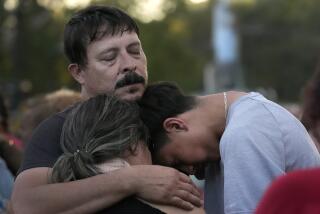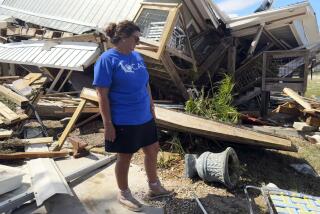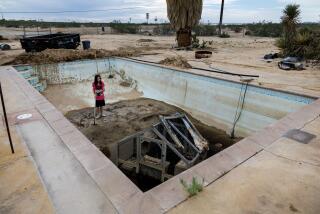S. Dakota Tornado Survivors Remember, Rebuild and Rejoice
SPENCER, S.D. — It’s a foggy morning on the prairie and Howard Heidelberger is sitting in his new garage, head bowed, hymnbook in hand, praying.
Outside, on the milky gray horizon, stands a skeletal wood frame, the beginnings of his new house. In this season to count blessings, it could be a reminder of Heidelberger’s losses.
His light-green house, a former parsonage shaded by lush ash trees where he and his wife, Beverly, reared three children over 21 years, is gone.
The stained-glass windows his wife refinished, the white ’64 Ford Falcon he lovingly polished, his grandmother’s high-back wooden rocking chair--they’re gone too.
So many things Heidelberger worked for and cherished were blown away, broken or buried one terrifying night in May when a killer tornado roared through this tiny town, bulldozing it like some demonic force in a Stephen King novel.
Six people died. Scores were injured. Spencer, population 312, was nearly swept off the map: The fire station, water tower, post office, grain elevator and library were destroyed. All four churches were demolished. So was almost every house, some lifted off their foundations and hurled into the air.
But six months have passed, Thanksgiving has arrived, and Heidelberger and other townsfolk who lost a lifetime’s worth of treasures and mementos in a single night are grateful.
“We’ve lost a lot, but we’ve gained a lot more,” he says, gently squeezing his wife’s shoulder as they stand among rows of folding chairs in their garage, which has temporarily been transformed into Trinity Lutheran Church this Sunday morning.
“We’re building a new home,” he adds. “We’re getting our church back. We have each other. We have our friends. And my family is so much closer. I’m more thankful than ever. My life was spared.”
On this day of giving thanks, Heidelberger and others who call Spencer home are measuring their good fortune by a simple yardstick: survival.
“Losing your housing is nothing,” says Sharon Reif, who worked nights and weekends with her husband, Scott, to build a new home. “I’m just glad we’re alive.”
Folks here tell amazing stories of how they were spared. One elderly woman swathed her head in her own handmade quilts. Others took refuge in their bathrooms. Heidelberger hunkered down on his hands and knees in his basement shower, while his house splintered and shook above him. Then one boom, and it was gone.
“I’m a different person,” he says. “My faith has strengthened. When I was in that shower, I knew God was there.”
The Saturday night storm was so ferocious it tossed mattresses onto overhead phone lines, sucked television sets out of windows and twisted a steel beam around a tree like taffy. Canceled checks and family photos were found fluttering in Minnesota towns--nearly 100 miles away.
Today, Spencer bears the scars: There are muddy fields and deserted streets where homes once stood and children once played. The bank is a “Twilight Zone” vision: Its gleaming silver vault, which defied the twister, sits uncovered on Main Street. The new bank will be built around it.
Trinity Lutheran will be the only church to get a new home. Sunday services continued this summer in a tent, and now, as winter approaches, a garage. Attendance has increased since the storm.
“Realizing it’s only by God’s will that they’re still here--that brings people back to church,” says Thomas Christopher, the pastor.
On this raw Sunday morning in November, Christopher leads 40 of the faithful in prayer, the garage lit by two dented golden candelabra pulled from the rubble of the old church. As the organ hums, the congregation, clutching red leather hymnals, softly sings: “He who stands firm to the end will be saved.”
Christopher remembers the morning after the storm, when he first saw the landscape reduced to piles of lumber and plaster. “I thought this is the end of Spencer,” he says, “and this is the end of my church.”
He wasn’t alone. Many believed that Spencer, founded as a railroad stop more than 100 years ago, had reached the end of the line.
Like so many small Plains towns, it had long been on the decline: The population was elderly, the school was closed, the lumberyard, the pool hall and the movie house, called the Hollywood, were only memories.
The tornado has forced some folks, many of them elderly, to leave Spencer. But family ties, a devotion to small-town life and a resiliency borne of hard winters and hard times on the prairie have brought others back.
Money has helped too. Nearly $5 million in government aid and private donations will help build new town offices, a fire station and senior citizens center. The Catholic church is building a parish hall. There’s a waiting list for two apartment buildings that are under construction.
Slowly, homes are going up, people are trickling back.
Delphia Stuby, a freckle-faced widow, was one of the first to return, starting life over at age 72--new pots and pans, new linens and bed, and a new home, courtesy of a most unlikely construction crew: state prisoners.
She bought the two-bedroom house the inmates built, and it was hauled by flatbed truck 70 miles to the same Main Street lot where she lived for 38 years--and almost died that night in May.
She survived by hiding in her bathroom as the charcoal-colored funnel cloud swooped down on her house. She remembers screaming, “Lord, no more!” A few days later, she suffered a heart attack.
After recuperating for a few months in a nearby town, she returned to Spencer, where her parents and grandparents are buried, the one place on earth where she has peace of mind.
“I had nightmares, terrible nightmares,” Stuby says of her time away. “As soon as I got here, I felt as calm as can be. My blood pressure is very good and my doctor tells me it’s because I’ve come back.”
Her living room holds most of the few possessions she salvaged: a table her grandfather carved for her, photos of her six children. She was unable to retrieve her father’s walking cane. Even talking about it brings tears to her eyes.
“People say, ‘We know how you feel.’ The hell you do!” snaps Stuby, who peppers her conversation with a mild cuss word or two. “You’ll never know.”
For the survivors, the tornado was a life-transforming experience.
“I look at nature a lot more,” says Susan Sieverding, whose family lost their house. “I stop and smell the roses. I do. No more hurrying.
“I appreciate the kids and husband more,” she adds with a smile, standing outside her new home. “You’re more patient. At least, you try to be.”
Her father-in-law, Don Sieverding, a retired pheasant farmer, says he knows there have been frustrations in getting Spencer started again.
“But the rewards are seeing something new go up,” he says. “People who didn’t speak before say, ‘Hey, congratulations, you’re getting a new home.’ ”
Sieverding says Spencer, already small, will shrink even more. But it will survive. Buildings will be new, and people will live here by choice.
“It’s selfish to say it’ll be a better town,” he adds, “but in some ways it will. It’s just a heck of a price to pay.”
This summer, he helped a son and daughter rebuild in this town that has been home to four generations of Sieverdings--the latest, a girl, baptized just weeks ago.
“I’m not a very emotional person,” he says. “But my voice just cracks and tears just run down my cheeks to see their homes. They’re just sitting in them, counting their blessings.”
More to Read
Sign up for Essential California
The most important California stories and recommendations in your inbox every morning.
You may occasionally receive promotional content from the Los Angeles Times.









